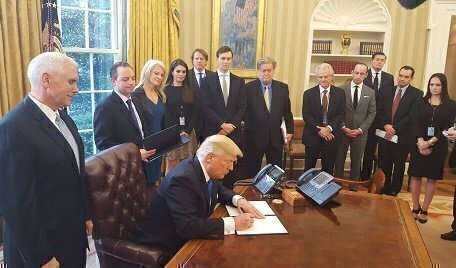The Fourth Circuit Appeals Court has ruled against President Donald Trump’s immigration-ban executive order, in another rebuke of the controversial policy. In a 10-3 decision made by the full court, Chief Judge Roger L. Gregory’s majority opinion had strong words about the executive order, starting with his opinion’s first paragraph.
Link: Read The Decision
 “The question for this Court, distilled to its essential form, is whether the Constitution … remains ‘a law for rulers and people, equally in war and in peace.’ And if so, whether it protects Plaintiffs’ right to challenge an Executive Order that in text speaks with vague words of national security, but in context drips with religious intolerance, animus, and discrimination,” Gregory wrote.
“The question for this Court, distilled to its essential form, is whether the Constitution … remains ‘a law for rulers and people, equally in war and in peace.’ And if so, whether it protects Plaintiffs’ right to challenge an Executive Order that in text speaks with vague words of national security, but in context drips with religious intolerance, animus, and discrimination,” Gregory wrote.
Gregory and the majority found that based on evidence of words and actions taken by Trump, as a political candidate, and the Trump administration, that “the evidence in the record, viewed from the standpoint of the reasonable observer, creates a compelling case that [the Executive Order’s] primary purpose is religious,” and therefore violating the First Amendment’s Establishment Clause.
He also rejected Justice Department's claims that the first version of the Executive Order was motivated by national security concerns. “President Trump issued the First Executive Order without consulting the relevant national security agencies, and that those agencies only offered a national security rationale after EO-1 was enjoined,” Gregory said. And Gregory rejected arguments that political campaign statements shouldn’t be considered in the court’s evaluation of the case. “The campaign statements here are probative of purpose because they are closely related in time, attributable to the primary decisionmaker, and specific and easily connected to the challenged action,” Gregory said.
Gregory did find that the lower court wrongly included President Trump personally in its national injunction order, but the remainder of the injunction will remain in place, subject to appeal.
One of the concurring judges, William Thacker, disagreed that Trump’s campaign statements should be considered as evidence, but he found that comments made by the Trump administration after the first order was issued led him to believe it was discriminatory.
Judge Dennis Shedd wrote one of the dissenting opinions, questioning the lower court’s rationale for a national injunction.
“The district court made the extraordinary finding - based on a preliminary evidentiary record - that the President exercised his otherwise lawful authority to effect the temporary pause primarily because he bears animus towards Muslims and wants to impose a ‘Muslim ban.’ Remarkably, the district court made this finding while also acknowledging that the Executive Order is facially neutral, that there are heightened security risks with the countries listed in the Executive Order, and that national security interests would be served by the travel pause,” wrote Shedd.
“Regrettably, at the end of the day, the real losers in this case are the millions of individual Americans whose security is threatened on a daily basis by those who seek to do us harm,” Shedd concluded.
“The district court’s approach is not only unprecedented, it is totally unworkable and inappropriate under any standard of analysis,” wrote Paul Niemeyer, another dissenting judge.
The federal Ninth Circuit is also considering a separate case about the immigration ban, and many legal experts view the cases as possibly heading to the Supreme Court for a final resolution.
Scott Bomboy is the editor in chief of the National Constitution Center.






